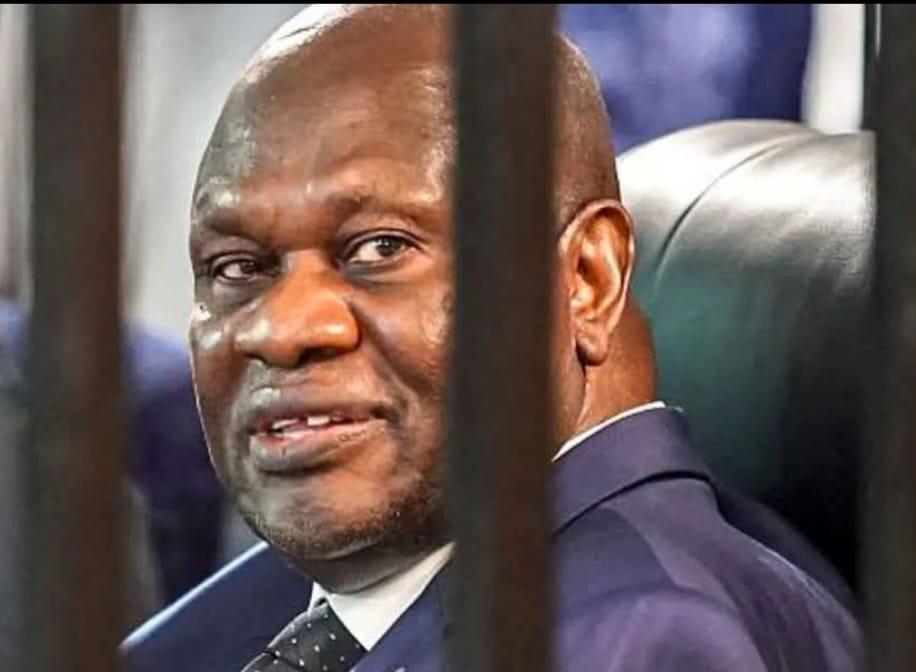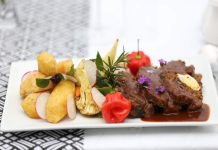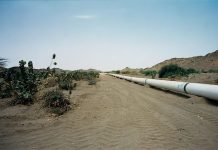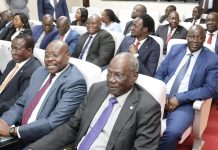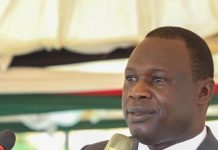Africa-Press – South-Sudan. The 21st session of the special court trying the suspended First Vice President Dr Riek Machar and seven co-accused continued on Friday at Freedom Hall, Juba, with the court examining the case investigator and the complainant from the National Security Service (NSS).
The session began with the cross-examination of Major General Basilio Thomas Wani, the investigator assigned to the case.
During questioning, Judge James Alala asked about the status of items seized during the investigation.
Major General Wani said that evidence relevant to the case, including mobile phones and a laptop, had been submitted to the court, while personal items such as guns and cash belonging to the accused were still held by the NSS.
He explained that the second accused had been taken to an NSS operations site during arrest, where a gold necklace and cash in US dollars were registered and retained by the agency.
However, when asked about the exact amount of cash, the investigator said he could not recall.
The judge also questioned Major General Wani about claims that the first accused, suspended Petroleum Minister Puot Kang Chuol, had allegedly sent money to purchase firearms.
The investigator admitted he had not questioned the accused about the source of the funds and clarified that the investigation focused on tracking the distribution of the money, which was sent to the commissioner of Nasir and distributed to local payams.
He also confirmed that the investigation did not cover fatalities among the White Army or SPLA-IO forces and that commanders of the White Army were identified according to clan leadership structures.
Following the investigator’s testimony, the court proceeded to hear from the complainant, Captain Richard Al-Kashif Apollo, a 37-year-old officer in the NSS Internal Security Bureau.
Representing the NSS, Captain Apollo outlined that the case, filed under number 1533-2025, originated from intelligence gathered on 21 January 2025 regarding plans by the White Army and SPLA-IO to attack the SSPDF garrison in Nasir.
He stated that Dr. Machar and his co-accused were implicated in mobilizing, financing, and providing intelligence to these armed groups, actions described as threats to national security.
Under cross-examination by Dr. Machar’s lawyer, Warnyang Kiir Warnyang, Captain Apollo admitted he did not have details on the exact methods of collaboration between the accused and the armed groups.
He also said he was unaware of the specific amounts of money provided for the alleged mobilization and rituals, the precise actions taken during press conferences, or what measures NSS undertook to prevent the Nasir attack after receiving intelligence more than a month in advance.
When asked by Judge Alala whether the intelligence was hearsay, Apollo responded that his role was limited to opening the case, while witnesses were responsible for providing detailed accounts.
He added that none of the accused were arrested prior to the Nasir incident; all detentions occurred afterwards.
The session highlighted the complexity of the charges against the eight accused, which include treason, terrorism, financing terrorist acts, conspiracy, crimes against humanity, and destruction of public property and military assets.
The prosecution claims that the clashes in Nasir in March 2025 resulted in the deaths of 257 soldiers, including a general, and were coordinated with Machar’s SPLM/A-IO faction.
The accused facing trial are: Puot Kang Chuol, Mam Pal Dhuor, Gatwech Lam Puoch, Lt. Gen. Gabriel Duop Lam, Dr. Riek Machar Teny, Camilo Gatmai Kel, Mading Yak Riek, and Dominic Gatgok Riek.
Presiding Judge James Alala Deng adjourned the case to Monday, 17 November 2025, instructing the prosecution to ensure that witnesses are ready for testimony.
The upcoming sessions are expected to focus on witness testimonies that will provide further details on the alleged coordination, financing, and mobilization efforts of the accused, and the role of the NSS in preventing the Nasir attack.
For More News And Analysis About South-Sudan Follow Africa-Press

